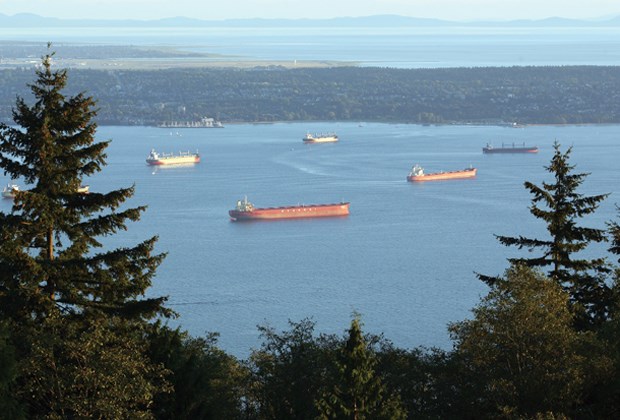New federal government regulations forcing oil tanker companies to pay hundreds of millions more for cleanup in the event of a spill have done little to reassure North Shore activists that it would be safe to dramatically increase tanker traffic in Burrard Inlet.
Deep Cove resident Janice Edmonds, founder of North Shore No Pipeline Expansion, a group opposed to the proposed augmentation of Kinder Morgan's TransMountain pipeline, said this week tougher regulations announced by Ottawa haven't allayed her fears.
"They advertise it as though it's going to fix the problem," she said. "It's not going to fix the problem."
Edmonds said her group believes if the pipeline expansion goes ahead, it isn't a question of if a spill will occur, but when.
This week, Ottawa announced several measures aimed at improving oil tanker safety. Among those, the government said it would establish new disaster response planning in areas of high tanker traffic, including southern B.C., modernize marine navigation systems and require companies to pay up to $400 million from a current industry insurance fund in the event of a spill. The government also promised to pay for further cleanup if needed and seek that money back from industry.
But Edmonds said one of the big problems is that nobody knows how to clean up diluted bitumen - heavy oil diluted by chemicals for transport through pipelines.
"People are thinking it's just oil and we can just clean it up," she said. "We can't. We don't know how."
Edmonds said experiments done on diluted bitumen so far have only been done in big tanks. How the bitumen would behave in a real scenario involving currents like those under the Ironworkers Memorial Second Narrows Crossing isn't known, she said.
Among other measures announced this week, Ottawa said Environment Canada, the Department of Fisheries and Oceans and other federal agencies would research into how heavy oil reacts when spilled in marine environments. The federal government said it would also allow alternative spill response measures, including treating the spill with various chemical agents, during emergencies.
Edmonds said that could potentially make the problem even worse.
Recently NOPE was one of the groups granted intervener status in the National Energy Board hearings on the proposed Kinder Morgan expansion.
Edmonds said her group will concentrate on potential human health impacts of a spill, including how chemicals like benzene and toluene could evaporate from the bitumen and become trapped in the air over populated areas.
The group has hired a Simon Fraser University professor who is an expert in toxicology and epidemiology to help with its submission.
Also this week, provincial Environment Minister Mary Polak announced Victoria has submitted more than 70 requests to Kinder Morgan asking for more details on spill response.
Last month, the Tsleil-Waututh First Nation filed a lawsuit in federal court, saying the federal government had failed to consult with them on the Kinder Morgan proposal.
If Kinder Morgan's application is approved, the existing Trans Mountain pipeline will be twinned with a larger pipe ending at the Westbridge terminal in Burnaby - directly across Burrard Inlet from North Vancouver.



